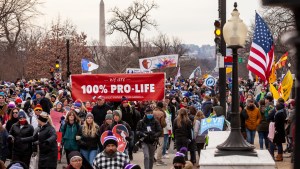On June 24, 2022, the Supreme Court of the United States struck down Roe v. Wade, the decision which legalized abortion across America.
The decision of the Supreme Court has now returned the issue to the states, allowing them to either ban or allow abortion, or otherwise regulate it.
The decision to overturn Roe v. Wade, occurred on the Catholic observance of the solemnity of the Sacred Heart of Jesus.
The feast was instituted after the private revelations of St. Margaret Mary Alacoque, who reportedly saw Jesus speak to her in the following words.
Behold the Heart which has so loved men that it has spared nothing, even to exhausting and consuming Itself, in order to testify Its love … I promise you that My Heart shall expand Itself to shed in abundance the influence of Its Divine Love upon those who shall thus honor It, and cause It to be honored.
Jesus’ Heart is often depicted on fire, representing the intensity of God’s love for all humanity.
Birth of John the Baptist
June 24 is also traditionally the feast of the Nativity of St. John the Baptist, though this year it was moved to the day before so that it would not be on the same day as the Sacred Heart.
St. John the Baptist was a prophet, preparing the way for the Lord. While still an unborn child, he even “leapt” in his mother’s womb, in an event called the Visitation. Still unborn, he was the first after Mary to rejoice in the Incarnation, as he recognized the presence of the Unborn Jesus in Mary’s womb.
This episode in St. John the Baptist’s life is often used by pro-life advocates to show the sanctity of human life in the womb.
With these two feasts converging today, it highlights the intensity of God’s love for all human life, especially all mothers and all unborn children.


